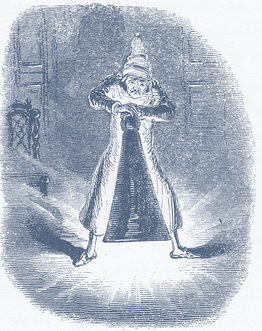
 N THE 2003 Christmas comedy Elf, Will Ferrell’s character—Buddy the Elf—has a favorite saying: “The best way to spread Christmas cheer is singing loud for all to hear.” At one point in the film, when Buddy first meets Jovie at Macy’s, she scoffs at this saying. He responds innocently, “If you sing alone, you can sing in front of people; it’s no different!” then begins to sing off-key in full voice. The grumpy floor manager pops out from behind a shelf and yells, “Hey! There’s no singing on the north pole!”
N THE 2003 Christmas comedy Elf, Will Ferrell’s character—Buddy the Elf—has a favorite saying: “The best way to spread Christmas cheer is singing loud for all to hear.” At one point in the film, when Buddy first meets Jovie at Macy’s, she scoffs at this saying. He responds innocently, “If you sing alone, you can sing in front of people; it’s no different!” then begins to sing off-key in full voice. The grumpy floor manager pops out from behind a shelf and yells, “Hey! There’s no singing on the north pole!”
In the first chapter of Charles Dickens’ A Christmas Carol, Ebenezer Scrooge is sitting in his office when a boy stops outside his door to sing a Christmas carol:
“…but at the first sound of God bless you, merry gentleman! May nothing you dismay! Scrooge seized the ruler with such energy of action that the singer fled in terror.”
…so offended is Scrooge by the joviality of the boy, and so threatened by the song’s expression of goodwill. Later on, upon meeting the Ghost of Christmas Past, Scrooge is blinded by the great light emitting from the head of the spirit, symbolizing Truth (among other things). Scrooge asks the Ghost to wear its cap so as to shield him from this light; the Ghost responds, “Would you so soon put out, with worldly hands, the light I give?” As the Ghost takes Scrooge through his past, we see the first glimpse of his eventual transformation when he views himself as a young boy. Seeing his young self, he is reminded of the singer from the night before. Scrooge remarks:
“Poor boy…I wish…but it’s too late now… There was a boy singing a Christmas Carol at my door last night. I should like to have given him something: that’s all.”
In his book Reflections on the Spirituality of Gregorian Chant, Dom Jacques Hourlier pours forth great wisdom regarding the power of music to affect us deeply. (Though Dom Hourlier speaks specifically about chant, much of what he has to say can be said, I believe, about all great sacred music.) Through sacred music, Dom Hourlier writes, one comes to “apprehend the fullness of language that merely spoken words can never adequately express.” Music educates us to a deeper meaning of the words; the marriage of music and words “transports (us) a thousand leagues beyond the dictionary.” Dom Hourlier goes on to say that the “richness and beauty (of music) give rise to prayer.” The synthesis of these two qualities—education and prayer—is that sacred music sanctifies those who listen and sing. In a very real way, it makes us more holy. Sacred music brings us together, in Dom Hourlier’s words, “from the horizontal point of view, since it unites people in its beauty, and from the vertical, because it leads us all to God.”
Most Catholics are readily familiar with Psalm 95, “If today you hear his voice, harden not your hearts…” Consider this Psalm and the two misers. There is no question that the store manager and Scrooge have hardened hearts. By shunning the music of Christmas, they are extinguishing the light that is the very essence of these songs and of singing, and all they have to offer mankind. (Scrooge, in fact, quite literally extinguishes the light of the Ghost of Christmas Past, by forcing him under his cap.) Thus, they are blotting out the voice of God, who speaks to us through all good things, who is “full of grace and truth.” We praise God and give thanks through singing the sacred music of Christmas; we offer the gift of music back to him. Yet, we can never understate the fact that we receive something through the experience of singing as well. Music plays a vital role in the drama of the liturgical year; when we live the liturgical year to its very fullest, it has the power to change our lives. Christmas without music would be incomplete. The music of Christmas forms us and aligns us to its joyful spirit of love and charity. At this time of year, all of us should bear in mind the potential for music to affect us deeply, and so let us finish the boy caroler’s song through music and in our lives:
“Now to the Lord sing praises,
All you within this place
Like we true loving brethren,
Each other to embrace,
For the merry time of Christmas
Is coming on a-pace.
O tidings of comfort and joy.”
We hope you enjoyed this guest article by Cody Willmot Mead.

